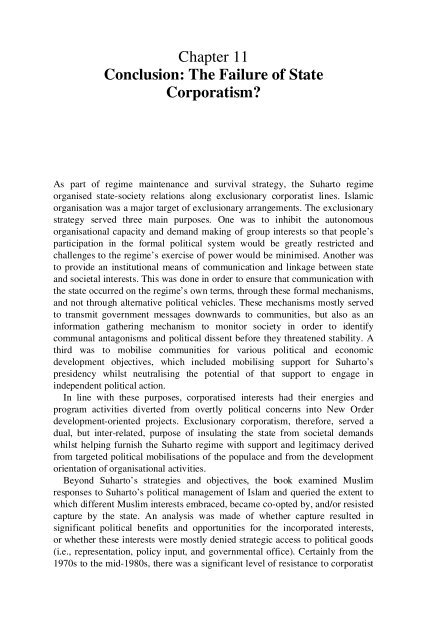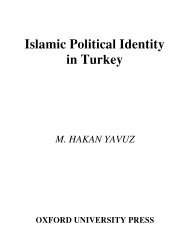- Page 2 and 3:
Managing Politics and Islam in Indo
- Page 5 and 6:
ContentsForeword viiPreface xAcknow
- Page 7 and 8:
viThe University Student Movement 1
- Page 9 and 10:
viiiWhile many authors have used a
- Page 11 and 12:
PrefaceThe book is the product of d
- Page 13 and 14:
Abbreviationsabangan Nominal Muslim
- Page 15 and 16:
xivFKLD Forum Komunikasi Lembaga Da
- Page 17 and 18:
xviKNPI Komite Nasional Pemuda Indo
- Page 19 and 20:
xviiiParmusi Partai Muslimin Indone
- Page 21 and 22:
xxWALUBIWMABYayasan AbdiBangsaYKPKY
- Page 23 and 24:
2 MANAGING POLITICS AND ISLAM IN IN
- Page 25 and 26:
4 MANAGING POLITICS AND ISLAM IN IN
- Page 27 and 28:
6 MANAGING POLITICS AND ISLAM IN IN
- Page 29 and 30:
8 MANAGING POLITICS AND ISLAM IN IN
- Page 31 and 32:
10 MANAGING POLITICS AND ISLAM IN I
- Page 33 and 34:
12 MANAGING POLITICS AND ISLAM IN I
- Page 35 and 36:
14 MANAGING POLITICS AND ISLAM IN I
- Page 37 and 38:
16 MANAGING POLITICS AND ISLAM IN I
- Page 39 and 40:
18 MANAGING POLITICS AND ISLAM IN I
- Page 41 and 42:
20 MANAGING POLITICS AND ISLAM IN I
- Page 43 and 44:
22 MANAGING POLITICS AND ISLAM IN I
- Page 45 and 46:
24 STATE CORPORATISM AND INDONESIA
- Page 47 and 48:
26 STATE CORPORATISM AND INDONESIA
- Page 49 and 50:
28 STATE CORPORATISM AND INDONESIA
- Page 51 and 52:
30 STATE CORPORATISM AND INDONESIA
- Page 53 and 54:
32 STATE CORPORATISM AND INDONESIA
- Page 55 and 56:
34 STATE CORPORATISM AND INDONESIA
- Page 57 and 58:
36 STATE CORPORATISM AND INDONESIA
- Page 59 and 60:
38 STATE MANAGEMENT OF MUSLIM ASSOC
- Page 61 and 62:
40 STATE MANAGEMENT OF MUSLIM ASSOC
- Page 63 and 64:
42 STATE MANAGEMENT OF MUSLIM ASSOC
- Page 65 and 66:
44 STATE MANAGEMENT OF MUSLIM ASSOC
- Page 67 and 68:
46 STATE MANAGEMENT OF MUSLIM ASSOC
- Page 69 and 70:
48 STATE MANAGEMENT OF MUSLIM ASSOC
- Page 71 and 72:
50 STATE MANAGEMENT OF MUSLIM ASSOC
- Page 73 and 74:
52 STATE MANAGEMENT OF MUSLIM ASSOC
- Page 75 and 76:
54 STATE MANAGEMENT OF MUSLIM ASSOC
- Page 77 and 78:
56 STATE MANAGEMENT OF MUSLIM ASSOC
- Page 79 and 80:
58 STATE MANAGEMENT OF MUSLIM ASSOC
- Page 81 and 82:
60 STATE MANAGEMENT OF MUSLIM ASSOC
- Page 83 and 84:
62 STATE MANAGEMENT OF MUSLIM ASSOC
- Page 85 and 86:
64 STATE MANAGEMENT OF MUSLIM ASSOC
- Page 87 and 88:
66 STATE MANAGEMENT OF MUSLIM ASSOC
- Page 89 and 90:
68 STATE MANAGEMENT OF MUSLIM ASSOC
- Page 91 and 92:
70 STATE MANAGEMENT OF MUSLIM ASSOC
- Page 93 and 94:
72 STATE MANAGEMENT OF MUSLIM ASSOC
- Page 96 and 97:
Chapter 5The Capture of Muslim Inte
- Page 98 and 99:
MANAGING POLITICS AND ISLAM IN INDO
- Page 100 and 101:
MANAGING POLITICS AND ISLAM IN INDO
- Page 102 and 103:
MANAGING POLITICS AND ISLAM IN INDO
- Page 104 and 105:
MANAGING POLITICS AND ISLAM IN INDO
- Page 106 and 107:
MANAGING POLITICS AND ISLAM IN INDO
- Page 108 and 109:
MANAGING POLITICS AND ISLAM IN INDO
- Page 110 and 111:
MANAGING POLITICS AND ISLAM IN INDO
- Page 112 and 113:
MANAGING POLITICS AND ISLAM IN INDO
- Page 114 and 115:
MANAGING POLITICS AND ISLAM IN INDO
- Page 116 and 117:
MANAGING POLITICS AND ISLAM IN INDO
- Page 118 and 119:
MANAGING POLITICS AND ISLAM IN INDO
- Page 120 and 121:
MANAGING POLITICS AND ISLAM IN INDO
- Page 122 and 123:
MANAGING POLITICS AND ISLAM IN INDO
- Page 124 and 125:
MANAGING POLITICS AND ISLAM IN INDO
- Page 126 and 127:
Chapter 6Nahdlatul Ulama: Between I
- Page 128 and 129:
MANAGING POLITICS AND ISLAM IN INDO
- Page 130 and 131:
MANAGING POLITICS AND ISLAM IN INDO
- Page 132 and 133:
MANAGING POLITICS AND ISLAM IN INDO
- Page 134 and 135:
MANAGING POLITICS AND ISLAM IN INDO
- Page 136 and 137:
MANAGING POLITICS AND ISLAM IN INDO
- Page 138 and 139:
MANAGING POLITICS AND ISLAM IN INDO
- Page 140 and 141:
Tenggara. And later that month, he
- Page 142 and 143:
MANAGING POLITICS AND ISLAM IN INDO
- Page 144 and 145:
MANAGING POLITICS AND ISLAM IN INDO
- Page 146 and 147:
MANAGING POLITICS AND ISLAM IN INDO
- Page 148 and 149:
MANAGING POLITICS AND ISLAM IN INDO
- Page 150 and 151:
Chapter 7Intra-Elite RivalryIncorpo
- Page 152 and 153:
MANAGING POLITICS AND ISLAM IN INDO
- Page 154 and 155:
MANAGING POLITICS AND ISLAM IN INDO
- Page 156 and 157:
MANAGING POLITICS AND ISLAM IN INDO
- Page 158 and 159:
MANAGING POLITICS AND ISLAM IN INDO
- Page 160 and 161:
MANAGING POLITICS AND ISLAM IN INDO
- Page 162 and 163:
MANAGING POLITICS AND ISLAM IN INDO
- Page 164 and 165:
MANAGING POLITICS AND ISLAM IN INDO
- Page 166 and 167:
MANAGING POLITICS AND ISLAM IN INDO
- Page 168 and 169:
MANAGING POLITICS AND ISLAM IN INDO
- Page 170 and 171:
MANAGING POLITICS AND ISLAM IN INDO
- Page 172 and 173:
MANAGING POLITICS AND ISLAM IN INDO
- Page 174 and 175:
MANAGING POLITICS AND ISLAM IN INDO
- Page 176 and 177:
MANAGING POLITICS AND ISLAM IN INDO
- Page 178 and 179:
MANAGING POLITICS AND ISLAM IN INDO
- Page 180 and 181:
MANAGING POLITICS AND ISLAM IN INDO
- Page 182 and 183:
Chapter 8Mobilisations and Counter-
- Page 184 and 185:
MOBILISATIONS AND COUNTER-MOBILISAT
- Page 186 and 187:
MOBILISATIONS AND COUNTER-MOBILISAT
- Page 188 and 189:
MOBILISATIONS AND COUNTER-MOBILISAT
- Page 190 and 191:
MOBILISATIONS AND COUNTER-MOBILISAT
- Page 192 and 193:
MOBILISATIONS AND COUNTER-MOBILISAT
- Page 194 and 195:
MOBILISATIONS AND COUNTER-MOBILISAT
- Page 196 and 197:
MOBILISATIONS AND COUNTER-MOBILISAT
- Page 198 and 199:
MOBILISATIONS AND COUNTER-MOBILISAT
- Page 200 and 201:
MOBILISATIONS AND COUNTER-MOBILISAT
- Page 202 and 203:
MOBILISATIONS AND COUNTER-MOBILISAT
- Page 204 and 205: MOBILISATIONS AND COUNTER-MOBILISAT
- Page 206 and 207: MOBILISATIONS AND COUNTER-MOBILISAT
- Page 208 and 209: MOBILISATIONS AND COUNTER-MOBILISAT
- Page 210 and 211: MOBILISATIONS AND COUNTER-MOBILISAT
- Page 212 and 213: MOBILISATIONS AND COUNTER-MOBILISAT
- Page 214 and 215: Chapter 9The Unravelling of Suharto
- Page 216 and 217: THE UNRAVELLING OF SUHARTO’S REGI
- Page 218 and 219: THE UNRAVELLING OF SUHARTO’S REGI
- Page 220 and 221: THE UNRAVELLING OF SUHARTO’S REGI
- Page 222 and 223: ICMI and, once he was forced outsid
- Page 224 and 225: THE UNRAVELLING OF SUHARTO’S REGI
- Page 226 and 227: THE UNRAVELLING OF SUHARTO’S REGI
- Page 228 and 229: THE UNRAVELLING OF SUHARTO’S REGI
- Page 230 and 231: THE UNRAVELLING OF SUHARTO’S REGI
- Page 232 and 233: THE UNRAVELLING OF SUHARTO’S REGI
- Page 234 and 235: THE UNRAVELLING OF SUHARTO’S REGI
- Page 236 and 237: Chapter 10Habibie and Party Plurali
- Page 238 and 239: MANAGING POLITICS AND ISLAM IN INDO
- Page 240 and 241: MANAGING POLITICS AND ISLAM IN INDO
- Page 242 and 243: MANAGING POLITICS AND ISLAM IN INDO
- Page 244 and 245: MANAGING POLITICS AND ISLAM IN INDO
- Page 246 and 247: MANAGING POLITICS AND ISLAM IN INDO
- Page 248 and 249: MANAGING POLITICS AND ISLAM IN INDO
- Page 250 and 251: MANAGING POLITICS AND ISLAM IN INDO
- Page 252 and 253: MANAGING POLITICS AND ISLAM IN INDO
- Page 256 and 257: CONCLUSION: THE FAILURE OF STATE CO
- Page 258 and 259: CONCLUSION: THE FAILURE OF STATE CO
- Page 260 and 261: CONCLUSION: THE FAILURE OF STATE CO
- Page 262 and 263: ReferencesBOOKS, MANUSCRIPTS, MONOG
- Page 264 and 265: REFERENCES 243Dauvergne, Peter. ‘
- Page 266 and 267: REFERENCES 245Honna, Jun. ‘The Mi
- Page 268 and 269: REFERENCES 247—‘Why Do So Many
- Page 270 and 271: REFERENCES 249—‘Islam and Polit
- Page 272 and 273: REFERENCES 251National University,
- Page 274 and 275: REFERENCES 253Nasional (Bagian II),
- Page 276 and 277: IndexABRIGolkar, 24, 26, 30, 34, 14
- Page 278 and 279: INDEX 257education, 36-39, 47-9, 50
- Page 280: INDEX 259Tanjung, Feisal, 114-17, 1




